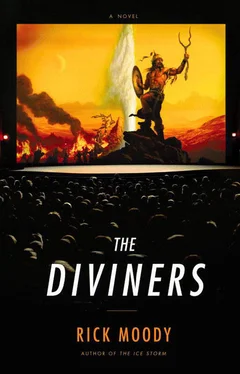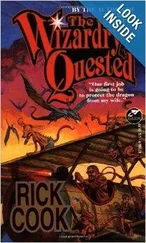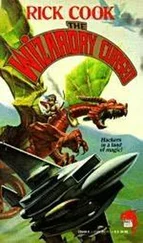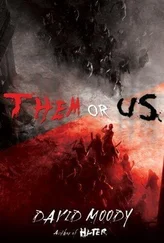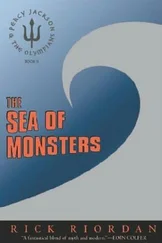“You’re a madman, and I can’t get enough of it. I don’t care about the wines. I only care about the way the language tumbles out.”
“Of course you do.”
“You’re like Proust.”
“Proust is like me. I’d never change the boys’ names to girls’ names.”
“He—?”
“I was not pampered as a child. I made myself up in a fever dream. It was not a taxing project. Now Randall Tork rules the world.”
Of course, the movie star had many demands upon his attention. Eventually, the vineyard owner, that briny lump of tissue, pried the movie star loose from his colloquy with Randall, and Randall recognized that this was inevitable, if boring. But before the movie star moved on to dally with the vacuous, diaper-clad elderly of Sonoma County, he leaned in to Randall and said, “Give me your card. We’ll get together.”
And Randall’s card is rather special. It’s from Smythson of Bond Street, the London office, special ordered, and it is on heavy stock with gilt edges, printed in Edwardian script from a hand-engraved copperplate: RANDALL TORK. IN THE CONSIDERATION OF FINE VINTAGES. E-mail address below. During the events described, Randall delivered the card with the ennui that appropriately suggested that the movie star could never have been luckier than just now. Indeed, the movie star smiled, before disappearing into the throngs.
This personage, Randall later admitted to his consort, Raoul, was called Thaddeus Griffin.
“Single Bullet Theory ?”
“The very one.”
“Was he a handsome man?”
“Exceedingly handsome, his handsomeness chiefly located in his tonsorial effects. He is a man with perfect hair, hair whose disarrangement is among the most calculated statements of beauty I have seen in many years.”
“You going to make room in your bed?” said Raoul mischievously.
“Fool,” Randall said. “I’m promised to you. You are my appointment and my disappointment. Moreover, this is a man who loves his wife. I can sense these things.”
Evidently the movie star managed such feats as producing from thin air the unlisted and fervently guarded telephone number of Randall Tork, because suddenly, out of the blue, in the middle of the crisis of Raoul’s addictive relapses, the movie star called not too long after the tiresome general election. He said he had something he wanted to discuss with Randall Tork and could he come out to Sonoma, just after the Thanksgiving holiday, to meet with him. There was no description of what was to be discussed. And yet Randall Tork, the greatest living wine writer, was not above a little adolescent excitement. An excitement that he elected not to display, lest his passions bring about one of the inexplicable torrents of Latin rage in Raoul.
Today is the day. Having completed six column inches of negligible interest and having fretted briefly over whether his powers are on the wane, Randall Tork has washed behind his ears, and he has brushed his teeth again, and he has set out a lovely Château Lafite from a year before he was born on a silver platter, alongside which are two glasses from Tiffany’s, and he has gone out into the living room, where Raoul is sobbing over a talk show about a woman who cannot accept her daughter’s navel ring, and he has hugged this dear boy, and he has asked if Raoul would make sure not to ask the movie star anything about his movies or his upcoming projects, because these people, he tells Raoul, do not like to have to talk about how they live. It would be better if he would just continue watching the program until Randall gives him the secret signal, and then he can go ahead and talk.
“You trying to hide me away from your famous boyfriend!”
“Raoul! Absolutely not!”
“You saying that I’m not good enough?” It’s just what he was afraid of. The outrage gathers momentum, like a chain reaction, beginning as a peevish jocularity and moving through bitter resentment into full-scale meltdown.
“I am saying no such thing! I’m saying that we do not yet know what the movie star wants, and in the absence of information, we should wait and see what it is that he wants, and that requires the stealthy strategy of a feline —”
“You calling me —”
“I’m not calling you anything except my dear sweet boy who has made my life tolerable. I’m just explaining —”
“I can go out on the street and wait for you there, if that’s what you want. I come into your house like this, you ought to treat me with respect. Because I have things I can do. I can go away!”
“Raoul! Please don’t do this! Not now. I am your cheering section and your federal agency. I love you no matter what. Please just understand —”
In fact, Raoul has taken a bad turn in recent days. Raoul has stopped looking rosy in the way he was, even though Randall is making sure that he takes what he’s supposed to take, and he has stopped expressing the joy he was previously expressing. Raoul has mostly lain around on the couch, complaining about a program called American Spy, which bothers him because he thinks the participants are unpleasant. Perhaps it will be this way until spring training, when his pastime can again lighten his heart. Whatever the cause, Randall Tork does not have liberty to ponder it, because the doorbell is ringing — because it is twelve noon sharp on the Monday after Thanksgiving, the appointed day and time — and now the movie star has come to call, here at the little house on stilts.
The movie star is graceful and full of humility as he stoops and crosses the threshold. The movie star hands over his scarf and his leather jacket, and he smiles at Randall and compliments him on the house, on its elimination of inessential furnishings, the concealment of all books, the warm light that suffuses the premises with genteel hospitality. All things, it should go without saying, that Randall Tork has premeditated in the presentation of his modest bunker. If the movie star notices the lump on the couch, he doesn’t say anything about it, and neither does Randall. At the kitchen table, after the wine is poured from the decanter and after the movie star performs a neophyte’s swirling and sniffing, the conversation at last begins.
“Let me know what you think,” Randall says. “Grape juice. Just a trifle. I have a couple of other things I want you to try.”
“Excellent.”
The movie star gives the wine pause, a pause that the movie star apparently thinks he must observe, before getting onto the subject he has genuinely come here to address.
“Listen, Randall — it’s okay if I call you Randall, right? I didn’t really come here to discuss wine, which I’m sure is kind of an unusual thing to say under the circumstances. Since that’s what you’re known for. I really admire what you do as a writer, and that’s why I’m here. It’s like I said the last time we saw each other. I think I said then that I didn’t think you were just a wine writer, any more than Hemingway was just a writer about bullfights. I think you’re one of the great contemporary writers, I really do, and believe it or not, I do read. Once you get locked into doing what I do, you’re sort of stuck there. There are lots of compensations, sure, but there are lots of costs, too. For example, no one believes I got a good education at a good college. No one believes that I love to read and that I admire the great storytellers, you know? It’s true. I even write.
“I wouldn’t exactly call what I do writing; it’s more like blocking out big chunks of story. You know. I try to develop scripts and stuff. That’s what I’ve tried to do for the last few years, in New York. And recently I’ve had a little good news. That’s really why I’m here. I’ve finally got something set up, or just about set up, something that has the potential to be a really big project, you know, the kind of thing that has major-studio involvement, major money on the table. A blockbuster.”
Читать дальше
